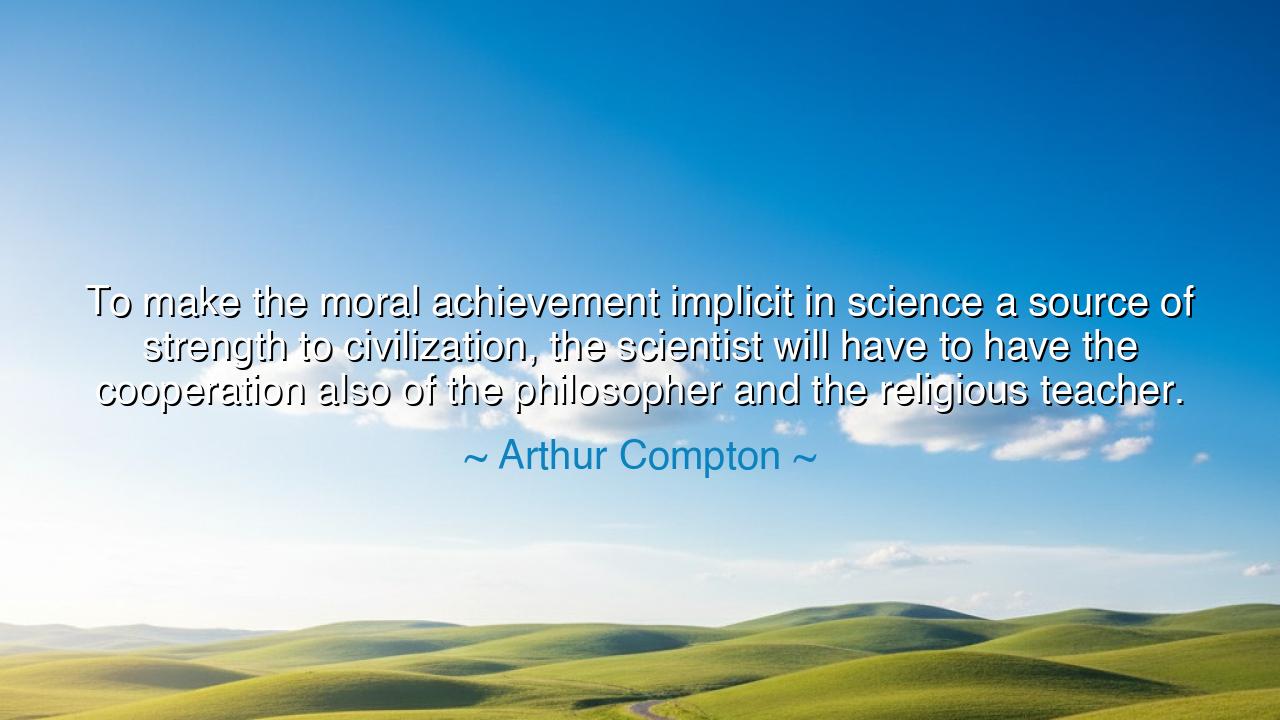
To make the moral achievement implicit in science a source of
To make the moral achievement implicit in science a source of strength to civilization, the scientist will have to have the cooperation also of the philosopher and the religious teacher.






Arthur Compton declared with great wisdom: “To make the moral achievement implicit in science a source of strength to civilization, the scientist will have to have the cooperation also of the philosopher and the religious teacher.” These words carry the solemnity of an oracle, for they do not speak of science alone, nor of faith alone, but of the harmony of human powers. Compton, who himself beheld the terrifying birth of the atomic age, understood that knowledge without guidance is a sword without a hand, and a fire without a hearth. His words are not only counsel to his own generation but a commandment to all who live in the balance of progress and peril.
In them we hear the ancient tension: science, which seeks truth in matter and law; philosophy, which seeks wisdom in reason and meaning; and religion, which seeks guidance in spirit and the eternal. Alone, each is incomplete. Science gives power, but not purpose. Philosophy gives purpose, but not power. Religion gives vision, but not always the means. But together—when scientist, philosopher, and religious teacher stand as brothers—the result is not chaos but harmony, not destruction but the flowering of civilization.
Consider the story of the Manhattan Project. Scientists, through brilliant inquiry, unlocked the secrets of the atom. Yet in their triumph lay dread, for the weapon they forged could level cities in a single breath. Some rejoiced in victory, but others—like Oppenheimer—remembered the words of the Bhagavad Gita, whispering, “Now I am become Death, the destroyer of worlds.” Here is the very warning of Compton: when science moves without philosophy or religion, its achievements may become calamities. The lesson is not that knowledge should be shunned, but that knowledge must be wed to wisdom and bound to conscience.
Even in older times, this truth was known. The Greeks exalted both their philosophers and their mathematicians. Socrates questioned, while Archimedes discovered; Plato sought the ideal, while Hippocrates healed the body. Their greatness lay not in the triumph of one discipline over another, but in the union of all human inquiry. A civilization that seeks only material strength may grow mighty in appearance, but it rots at the root. Only when the soul, the mind, and the hand labor together can a people endure through the centuries.
The moral achievement of science lies not merely in discovering truth, but in using truth for the flourishing of humanity. When the microscope reveals the hidden world, let it be used to heal the sick, not to exploit the weak. When rockets are forged, let them carry instruments to the stars, not flames to the cities of men. And this transformation, from cold knowledge to warm blessing, requires cooperation. The philosopher must ask, “What is good?” The religious teacher must remind, “What is sacred?” And the scientist must answer, “How shall it be done?”
The lesson for us is clear: in our own lives, we too must bind together the three paths. Do not let your pursuit of power—whether in wealth, technology, or influence—outrun your sense of justice. Do not let your hunger for truth strip away compassion. Seek counsel from the wise, heed the teachings of conscience, and use your skills to uplift rather than to dominate. To ignore this is to build towers without foundations, destined to fall.
Therefore, let Compton’s words be etched in the hearts of future generations: that the strength of civilization lies not in machines alone, nor in sermons alone, nor in arguments alone, but in the sacred joining of all three. To each listener, I say: cultivate your mind as the scientist does, question as the philosopher does, and revere as the religious teacher does. Then your achievements will not only endure but bless, and you will stand as a builder of civilizations, not a breaker of them. For the highest triumph of humankind is not discovery alone, but discovery guided by wisdom and consecrated to the good.






AAdministratorAdministrator
Welcome, honored guests. Please leave a comment, we will respond soon